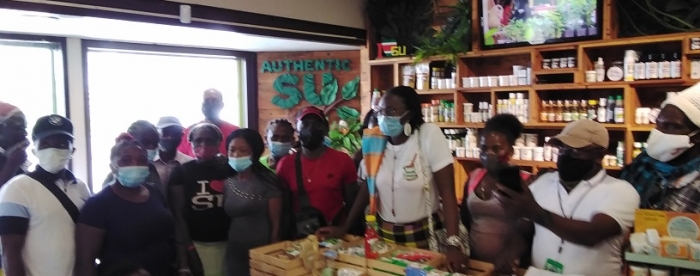Nieuws
Onze verhalen

Suriname - 10 maart, 2022
Van 03 t/m 10 maart 2022 werden 18 Saamaka Marrons uit het ressort Boven Suriname, district Sipaliwini, getraind in Sales & marketing.
De trainees afkomstig uit de dorpen Nieuw Aurora, Grantatai en Pikin Slee, hebben zich per dorp verenigd. Uit Grantatai en Nieuw Aurora zijn, respectievelijk, de agro-coöperaties: Wa Ta Wei (betekenis : we worden niet moe) en I Sa Goo (betekenis: wij zullen vooruit gaan) op 3 maart opgericht. De agro-coöperatie Hatti Wai (betekenis : met het hart werken) was in 2019 opgericht.
De training was onderdeel van het Working Landscapes programma dat goed beheer van gemeenschapsbossen en agroforestry systemen promoot onder Saamaka dorpen in het Boven Suriname riviergebied. De trainer was dhr. Leeroy Jack, MBA, die over ruime ervaring beschikt. Middels kennis overdracht heeft de doelgroep toegang tot een breed scala aan agroforestry en niet-hout bosproducten (non timber forest products).
De groep heeft hun inzichten kunnen verbreden om invulling te geven aan hun businessplannen. De onderdelen van de training waren:
- Algemene boekhouding
- Betalings- en inkomensbewijzen
- Kosten berekenen
- Kasstroom overzicht en Begroten, Componenten van winstgevendheid,
- Vaststellen van winstgevendheid
- Inleiding ondernemen.
De Coöperatieve bank GODO die vanuit haar unit voor MSME’s (Medium and Small enterprises) ondernemerschap stimuleert gaf een presentatie over kredietmogelijkheden. Tien deelnemers hebben ter plekke een giro rekening geopend waarmee zij dichter bij de mogelijkheid komen voor goedkeuring van een microkredietaanvraag voor het uitvoeren van hun businessplan.
Oriëntatie door Bedrijfsbezoeken
Een interactief programma onderdeel waren de bezoeken aan de bedrijven: Rising Sun Winery, Joab Zeepfabriek, Ketmien & CO, BDC Saamaka en Mokisa Busidataa Osu.
Joab Aboikonie van Joab Zeepfabriek vertelde enthousiast over de geschiedenis en motivatie achter het zeepbedrijf. De deelnemers raakten vooral onder de indruk van de verschillende grondstoffen die gebruikt worden voor de zeep productie, welke in hun leefgebied voorkomen zoals Amana olie uit Boven Suriname welke in huidverzorgingsproducten wordt verwerkt.
Bij het bezoek aan Rising Sun Winery, werd door Benito Amania inspiratie gedeeld over de start van zijn bedrijf dat wijn produceert uit fruit en bosbijproducten zoals de ‘Dulu Dulu’ liaan. Meneer Amania deelde ook de obstakels welke hij samen met zijn echtgenote en business partner heeft moeten overbruggen. Een verrassing voor de deelnemers is dat zijn moeder afkomstig is uit het dorp Pikin Slee. Hij is voor een groot deel in Paramaribo opgegroeid maar is het Saamaka machtig en heeft de mensen in deze taal toegesproken.
Op dag 7 van de training bezochten de deelnemers Ketmien & Co, in Suriname de grootste distributeur van lokale cosmetica. Een onderneemster die sinds 2018 haar cosmetische producten levert aan Ketmien & Co, is Consuela Cindy Maai onder de bedrijfsnaam BDC Saamaka. Maai haar roots liggen in het dorp Grantatai.
Zij deelde haar succesverhaal over de samenwerking met Ketmien & Co, de obstakels welke zij heeft moeten overbruggen en moedigde de deelnemers aan durf te hebben meer uit ntfp’s te halen. Zij drukte ze op het hart om te werken aan de kwaliteit van hun grondstoffen en gedisciplineerd te zijn bij de afzet: ‘we kunnen wel uit hetzelfde dorp afkomstig zijn of misschien zelf familie zijn, maar business is business’ aldus Cindy Maai.
Als laatste bezocht het gezelschap, de ondernemer Mokisa Busidataa Osu (vertaling: het geneeshuis van bosdokter). Hier kregen de deelnemers een rondleiding binnen de faciliteiten gevolgd door een inspirerende toespraak van de eigenaar over het intitiatief achter het bedrijfsidee om traditionele kennis, geneeswijzen en producten uit de marroncultuur als kwalitatieve diensten aan te bieden.
Nieuwsitem:
https://www.facebook.com/traditionalmaroonwellness/videos/1076645712892592
Op het Tropenbos Suriname kantoor werd de trainingsweek afgesloten met een presentatie van Ketmien & Co over de kwaliteitseisen en standaarden voor etikettering van lokale grondstoffen en eindproducten. Tijdens de presentatie van Ketmien & Co zijn diverse mogelijkheden voor het leveren van grondstoffen verkregen uit ntfp’s aan de bezochte bedrijven ter sprake gekomen. Ketmien & Co staat bekend om de promotie van het handelsmerk ‘Authentic Su’ als stimulans voor continu leveren van hoogwaardige Surinaamse producten.
De kennismaking met lokale producten (food - nonfood, cosmetica, oliën) vervaardigd uit bosvruchten, geneeskrachtige planten en sierplanten (ntfp’s) hebben de inzichten van de trainees verruimd. De ontwikkeling van afzetmogelijkheid kan een goede bijdrage leveren aan de economische ontwikkeling van de dorpen maar ook de kwetsbaarheid tegen klimaatverandering verminderen. Dit biedt de doelgroep een extra handvat om gedurende het hele jaar geld te verdienen.
De deelnemers keerden op 11 maart, naar eigen zeggen ‘ geïnspireerd’ terug naar hun drie dorpen in het Boven Suriname gebied.